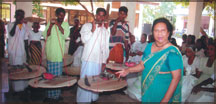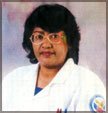|
DAILY NEWS ONLINE |
|
|
|
OTHER EDITIONS |
|
|
|
|
|
|
|
|
|
OTHER LINKS |
|
|
|
|
|
|
 |
|
|
|
|
Dr. Carlos Corvalan WHO scientist who contributed to the 'Millennium Ecosystem Assessment Study' touching on over-eating says:
"Where ill-health is caused by excessive consumption of what the world's ecosystem provides for man such as - water, food and energy. Substantial reduction in consumption, would give the right of access of those essential resources to the marginalised communities in the world, and thus improve their health".
The report warns
The Millennium Ecosystem Assessment (MA) synthesis report warns that the erosion of ecosystems could lead to an increase in existing diseases such as malaria and cholera, as well as a rising risk of new diseases emerging.
Worsening ecosystems will also affect the world's ability to meet the UN Millennium Development Goals (MDGs).
Planets life support system
"Ecosystems are the planet's life-support system. They are fundamental to human health and indispensable to the well-being of all people everywhere in the world".
The work of the Millennium Ecosystem Assessment makes clear how ecosystems and human health are inter-twined - and further highlights how important it is that decisions related to economic development also protect the environment, in order to ultimately safeguard human health."
Environmental change and human health
The links between environmental change and human health are complex because they are often indirect, displaced in space and time, and dependent on a number of modifying forces. There are two ways of avoiding diseases and injury caused by ecosystem disruption. One is to prevent, limit or manage environmental damage; the other way is to find ways to protect individuals and populations from the consequences of ecosystem change.
Fundamental need to ensure
"One of the striking and over-arching conclusions of this assessment lies in the fundamental need to ensure ecological sustainability to safeguard ecosystems and therefore protect human health in the long-term," said Dr. Carlos Corvalan, a WHO scientist who contributed to the MA report.
"Where ill-health is caused by excessive consumption of what the ecosystem provide such as water, food and energy, substantial reduction in consumption - and right of access to essential resources to marginalised communities - would have major health benefits."
Seminar at Health exhibition :
Effects of advertising on Health
At Sri Lanka's first exhibition on Health and Health Care products being planned to be held at the BMICH in May, one of the highlights is to be a seminar on the effects of advertising on health.
Director of Private Sector Health Care in the Ministry of Health and Nutrition Dr. Amal Harsha de Silva who is planning this three day exhibition from May 13 to 15 said, this will be an annual event hereafter providing a platform for the general public to visit and view and become aware of the numerous healthcare services available for them both in the public and private sector.
He said the convention arm of the National Chamber of Commerce (NCCSL) is jointly participating with the Ministry in organising this event, which apart from the exhibition side, will take up several health issues in a series of seminars to be held in the course of the event.
A key seminar among them will be one of the extent to which food advertising plays on people's health.
He said the medical profession felt that greater control on food advertising is needed at the moment, as some of the advertisements carried both in the print and electronic media really affects people's health.
He said this seminar which will be attended by medical, nutritional and advertising personnel will really go into depth on this matter and some consensus is expected to be achieved.
There will also be seminars on introducing sex education in schools. Fast food consumption, popularising physical fitness exercises, controlling diabetic through lifestyle changes, family planning for good health etc.
Several countries will take part in this exhibition. Japan, UK, USA, Singapore, India, Pakistan among others. Admission to the exhibition will be by a Rs. 20 ticket, which will entitle the entrant for free blood grouping test, other medical checkups will also be available at reduced rates.
The organisers are planning for a star attraction at this event that will be a Health Forum where all Ministers of Health who are still living will be participating. This would possibly be the beginning of national unity in national issues like health.
Chief Operations Officer, NCCSL Maneesha Hindurangala participated at the interview.
Tsunami affected fisherfolk get kitchen utensils and Pingos(Kadas) from Doctors' Wives' Association
Doctors' Wives' Association headed by Chrissy Aloysius (Wife of SLMA Ex-President, visiting lecturer PGIM and Family Physician Dr. Dennis J. Aloysius last week launched their tsunami re-habilitation project in Moratuwa by providing assistance to fifty affected fishermen families in Angulana with kitchen utensils for the women and Pingos Kadas for the men to re-start their house to house visits in selling fish.

Mrs. Aloysius speaking to the assembled said this was the fist phase of their tsunami social service project. In phase two, they were planning to provide money to repair some of the damaged boats of the fishermen. She said phase one of the project had cost the Association about Rs. 500,000 and she thanked the members of the Association. Ms. Badra Jayaweera, Rynee Mendis, Ranjani Thuraisingham, Zamani Nazeem, Thivaneshi Fernando, Mohini Gunasekera and Shamila Nazar in particular and doctors who contributed and helped in the project.
Dr. Vidya Jayawardena gets Earnest Bors Award
Vidya Jayawardena, MD, SGU '93, received the Ernest Bors Award for Scientific Development for her work on Bacteriuria in Neurogenic Bladder and its significance in spinal cord injury. This award for original research is sponsored by the American Paraplegia Society (APS) and honours Ernest Bors's lifelong commitment to spinal cord injury and research.

Dr Jayawardena's submission was chosen from over 200 submissions published in the Journal of Spinal Cord Medicine. A staff physician in the Hunter Holmes McGuire VA Hospital and Assistant Professor in the Department of Physical Medicine and Rehabilitation Medicine at Virginia Commonwealth University, Dr. Jayawardena has been working in the spinal cord injury field since the summer of 2000.
At the 2002 APS meeting, Dr Jayawardena presented research on the significance of Bacteriuria in Neurogenic Bladder. In 2003, she discussed her work on preventing pressure ulcers via kinematic global positioning system technology, and in 2004, she delivered a poster presentation on preventing spinal cord injury using an electronic garment.
Dr. Jayawardena enrolled in the North Colombo Medical School in the late 1980s to fulfill her childhood dream of becoming a physician, but continuing civil unrest forced her medical school to close. St. George's University, working with representatives of the Sri Lankan Government, worked out an agreement whereby advanced standing and some scholarship monies were granted to qualified students. Dr. Jayawardena was one of these students.
Why inhaled medication is better for asthma
When a drug is swallowed in tablet form, it is absorbed into the blood stream by the stomach and the intestines. This way, the drug reaches not only the organ where the drug is supposed to act, but also other organs where that drug can exert its adverse effects.
In asthma, the site where the drug action is needed is the airways of the lungs.
Therefore, inhaled drugs have the following advantages over oral drug in the treatment of Asthma:
1.Drug is delivered directly to the site where the action is needed
2. There is no absorption of the drug to the blood stream, so that there will not be any adverse effect
3. The onset of action is rapid than when the drug is given orally
Steroids most important
Out of all drugs which are given in the treatment of persistent asthma, steroids are the most important preventive drugs.
Persistent asthmatics need long term steroid treatment and long-term steroids should not be given orally as they can cause adverse or unwanted effects such as Diabetes, Osteoporosis (weakening of the bone), and Cataracts.
Therefore, you can realize the importance of giving drugs in the treatment of asthma as inhalers, especially when it comes to steroids.
Then, there are some asthma drugs which are available only as inhalers.
Expense the only drawback
From a practical point of view, the only disadvantage of inhaled drugs is that they are more expensive than the tablet form.
This is especially so in the case of steroids, which must be given in the inhaled form in long-term treatment, even if the other asthma drugs are given as tablets.
There is a myth among the public that inhaled drugs are addict forming and have more adverse effects than tablets. There is absolutely no basis for such beliefs.
Success on correct technique of inhalation
Inhaled drugs are available in powder form and aerosol form.
The success of inhaled medication depends on the correct technique of inhalation. If the patient does not inhale properly, he or she will not get the expected benefit. Therefore, it is the duty of the doctor to teach and the duty of the patient to learn the correct way of inhalation.
Some patients have no faith in inhaled drugs merely because their inhalation technique is incorrect and the drugs have not worked on them.
Drawback in the state Hospitals
The main drawback in the treatment of asthma in the state sector hospitals is that inhaled drugs are not freely available to the patients.
Even at low doses, the monthly cost of inhaled steroid treatment alone costs around Rs. 300 - 400 for a patient. Most of the patients who visit state hospital clinics which treat asthma, find it difficult to afford inhaled drugs.
Therefore, asthma clinics should be set-up-in at least major hospitals and inhaled medication should be made available freely to asthmatics through these clinics.
|
|
 |
 |
 |
 |


